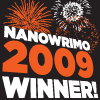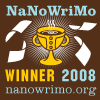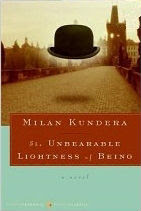Yes, for once I am posting in the middle of the day! And I’ve somehow managed to do so on one of my university’s computers, which for some inexplicable reason turn all of Blogger’s text into Chinese. The meme was borrowed from Amanda at A Patchwork of Books.
What are you reading right now?
Rebecca by Daphne du Maurier, a selection which had one of my lecturers remarking, ‘I didn’t think anybody still read her’. Buried Treasure by Victoria Finlay, a fascinating non-fiction book about the history of mankind’s love affair with various precious stones. And Governors’ Wives in Colonial Australia by Anita Selzer, which I really must get around to finishing. Unfortunately only the first of these books is actually with me. I was meant to have a computer prac this morning, but apparently the teacher decided to move everything back one week to accommodate the majority who were having serious trouble with the program and had fallen behind. But he didn’t think to tell us this, so I spent Monday afternoon getting completely up to date ... and arrived at the class to discover that I had nothing to do and seven hours until my next class. And, of course, I live too far out in the suburbs to bother going home. (Hence the unexpectedly punctual blogging.)
Do you have any idea what you’ll read when you’re done with that?
Let’s see ... there’s those dozen-odd other library books, next month’s three challenge books (five, if I do R.I.P. II), about three dozen other books....
What’s the worst thing you were ever forced to read?
A toss-up between two. The first was in Year 8 English, and was called How to Tell Your Parents That You’re Straight. The title says it all - or I hope it does, because post-traumatic amnesia kicked in and I can’t remember a thing about the book itself. Only that we all were assigned different books, so no-one else was in the same boat; and my mother tried reading it herself because she couldn’t believe it was as bad as I claimed. (She changed her mind.)
The second was Year 11 English - Falling, by Anne Provoost. No amnesia this time, alas. It was one of those flashback books, that start with a suitably dramatic incident (a dancer’s career being destroyed by a car crash) and circled back to see how it happened (something about her friend getting in over his head with a bunch of white supremacists). Just three problems: first, friend Lucas was a spineless twit with all the character of a wet Kleenex. How could he not see that Benoit and co. were bad news? Second, Lucas’s idiotic decisions didn’t actually cause the crash, as might have been expected from the structure of the book. And third, my teacher seriously thought a story featuring Belgian neo-Nazis would be really relevant to a classful of kids from the quiet suburbs of Canberra. Uh, yeah....
What’s the one book you always recommend to just about anyone?
Er ... no idea, since recommending books isn’t something that I get the chance to do very often.
Admit it, the librarians at your library know you on a first name basis, don’t they?
Actually, no; but I suspect this has more to do with the sheer size of my most-frequented library branch that any lack of visiting on my part. That, and the fact that from long-standing habit I always use the self-check machines (my favourite library from my Canberra days, Belconnen, tended to have queues).
Is there a book you absolutely love, but for some reason, people never think it sounds interesting, or maybe they read it and don’t like it at all?
I can think of plenty of books I love that my mother doesn’t find in the least interesting, but the general population ... I don’t know. Probably something quite large.
Do you read books while you eat? While you bathe? While you watch movies or TV? While you listen to music? While you’re on the computer?
Yes, except at breakfast, when I don’t have time to get caught up in a good book. There was a time when my mother would tell me off for reading at the dinner table, but she’s long since given up. No, because I shower and can’t think of a way to combine that with reading. Wallowing book in hand in a bathtub filled to the brim with bubbles and hot water does have a certain theoretical appeal, but I’d be too terrified of dropping the book (and besides, we’re on Level 5 water restrictions). Movies, no but tv, yes. I do try to confine my reading to the ad breaks, but it doesn’t always happen. Yes, often. And, only if my internet connection is having a really slow night.
When you were little, did other children tease you about your reading habits?
Probably. Can’t be entirely certain, because I prefer to make my memory of my schooldays as hazy as possible, but I got ridiculed for damn near everything else so I’m sure I was for this as well.
What’s the last thing you stayed up half the night reading because it was so good you couldn’t put it down?
I actually can’t remember! I did sit up later than usual with In Cold Blood, but nowhere near half the night.




























